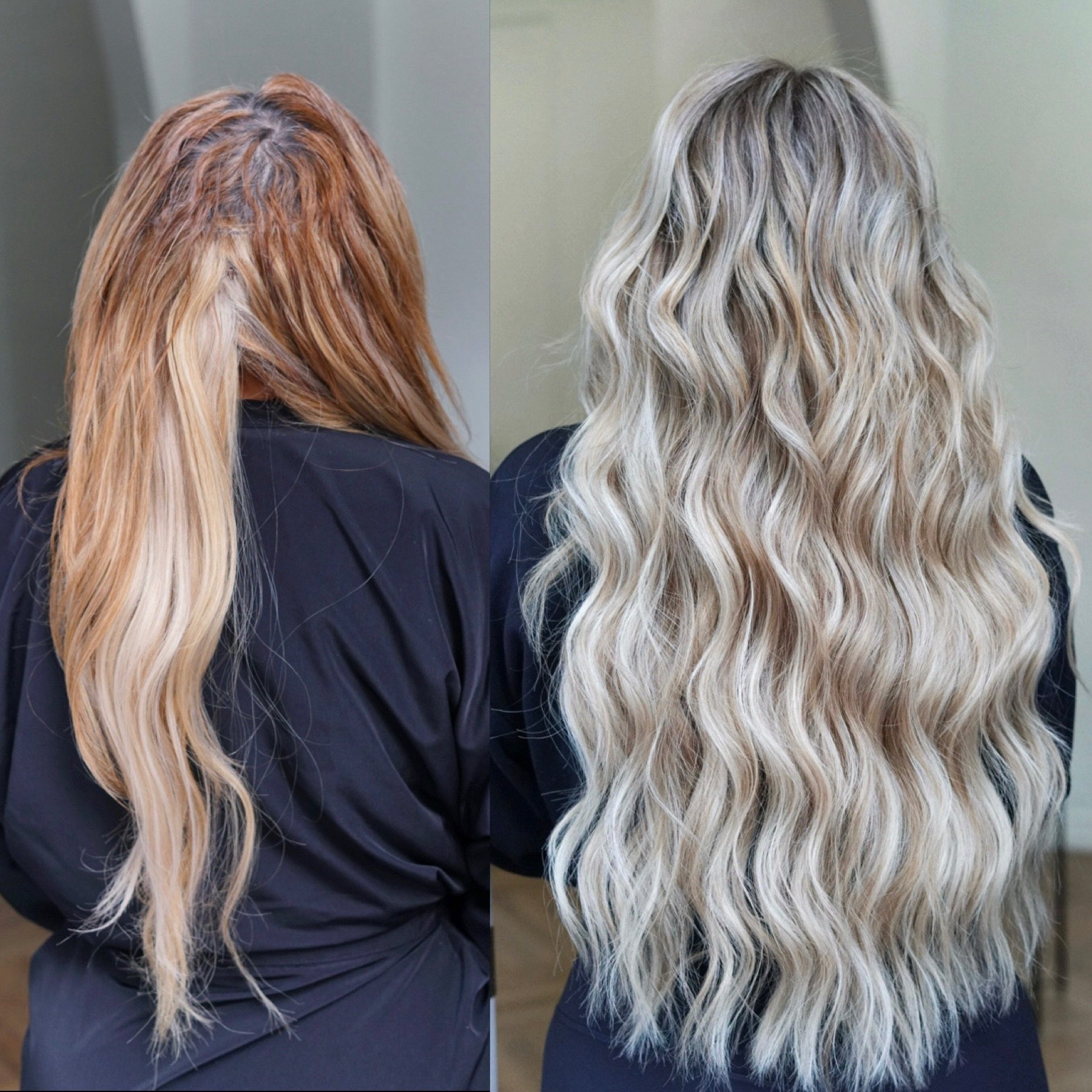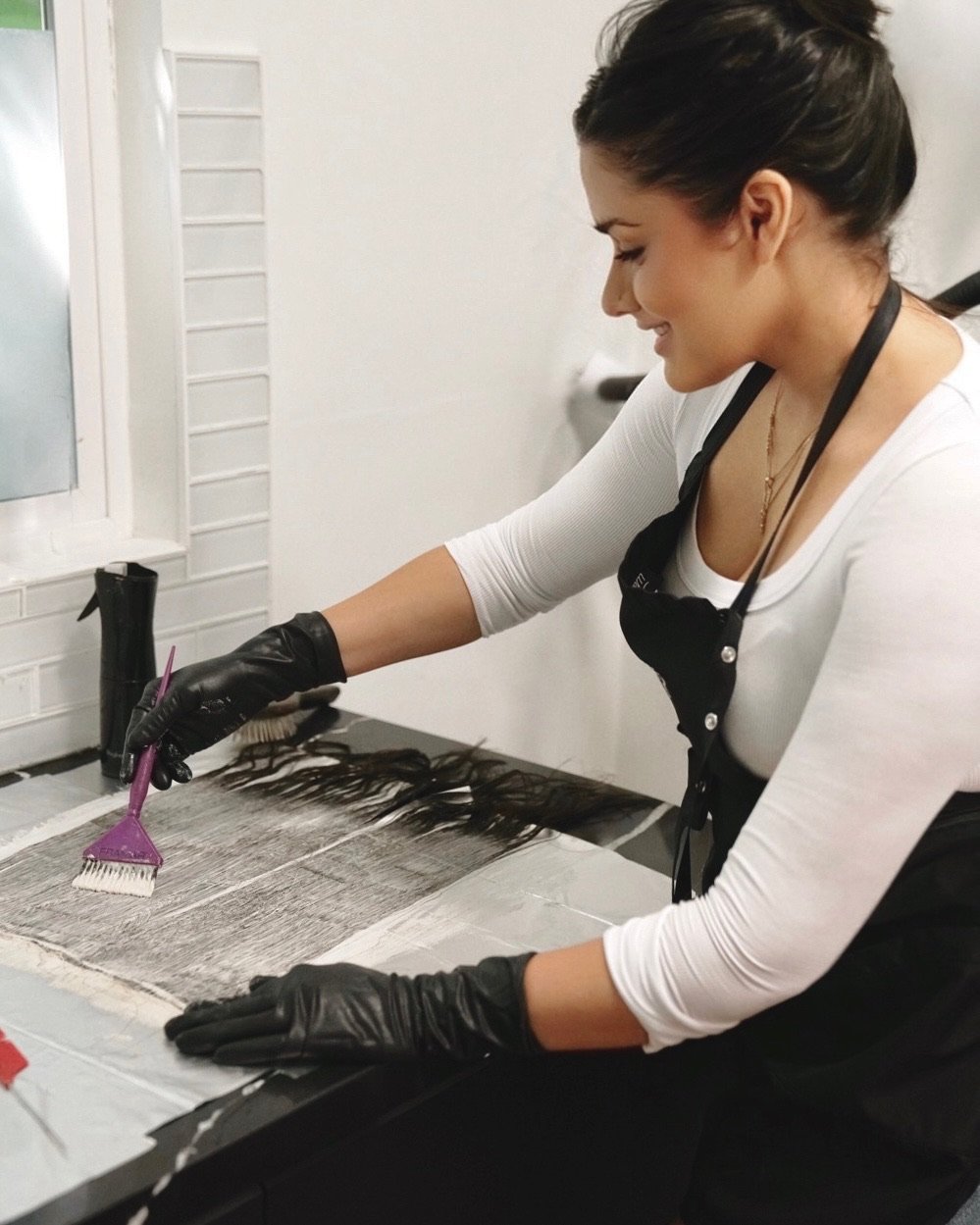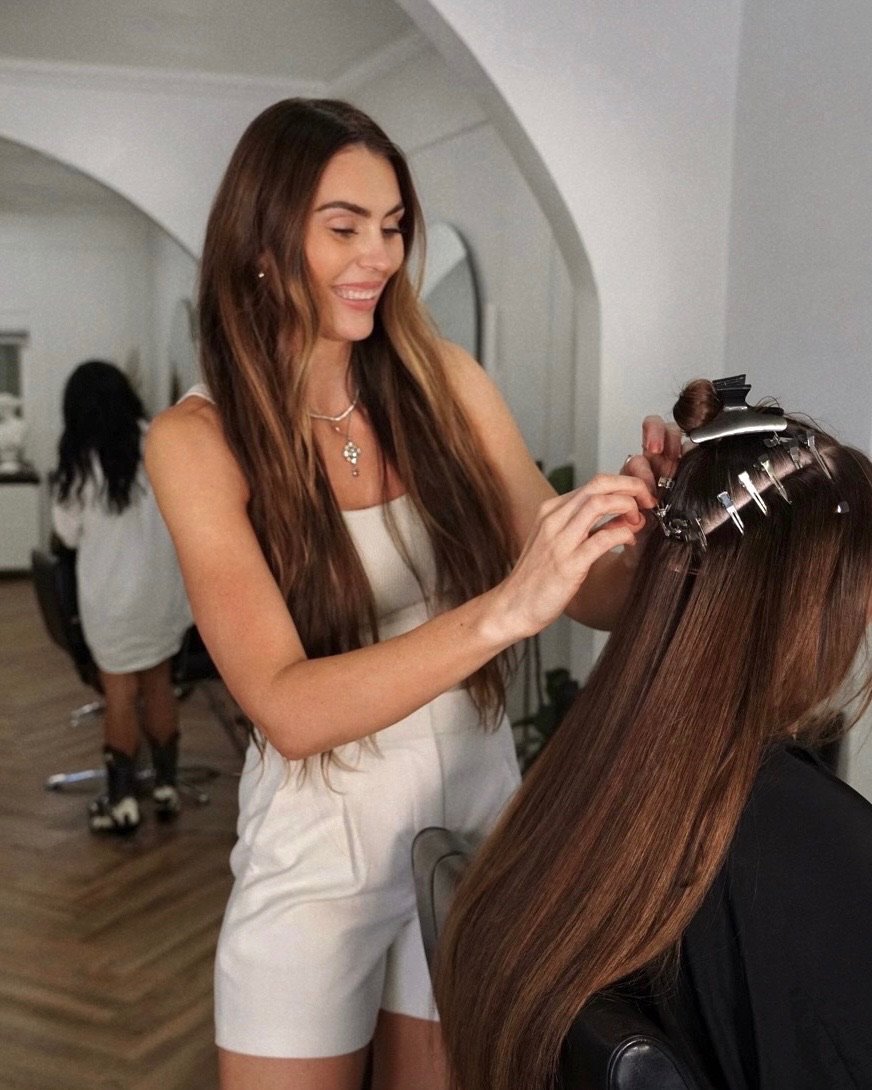Hair extensions have become an increasingly popular way to achieve volume, length, and style versatility.
Whether you're considering extensions for the first time or you're a seasoned extension-wearer, you might have questions.
At Kashmir, we believe in providing clarity to our clients. We want to help you make informed decisions about your hair journey. Here are some of the most frequently asked questions about hair extensions. We’re not just covering our method, we’re looking at all hair extensions holistically.
1. What are the different types of hair extensions?
The main thing to remember when looking at the variety of hair extensions available is that the method matters. Choosing the right method for your hair type, concern and desired result is crucial.
There are several types of hair extensions, including:
Clip-ins: Temporary extensions that can be clipped onto your natural hair. Need to be removed at night and when showering/swimming.
Tape-ins: Larger sections/panels of hair attached via double-sided tape.
Sew-ins: Wefts (usually thicker machine made hair) sewn to a braid using your own hair.
Fusion & Pre-bonded: Very small single strands using different adhesives, such as keratin-glue to attach with lots of small contact points throughout the head.
I-Tips & Beaded Individuals: Very small single strands of hair attached by using small aluminum beads and many contact points distributed throughout the head.
Natural Beaded Rows (NBR): Utilizing smaller contact points spaced apart with small beads and a string tracks.The most lightweight hair extension application method that creates maximum length and fullness using wefts. Each contact point is able to be moved around for a healthier approach to the scalp. This is the method that Kashmir Extensions uses.
2. How long do hair extensions last?
The lifespan of extensions varies based on the type. Most extension methods require an adjustment, lift, or tightening every 2-3 months to promote scalp health. Depending on the method the time it takes to reinstall could be anywhere from one hour to as long as 6 hours.
Kashmir Extensions average client takes about one hour to reinstall.
Hair extensions lifespan depends mainly on quality and not type. Meaning where the actual hair is sourced from and if it has been heavily processed or not. A typical, high quality set of hair should last about 6 months before needing to be replaced.
Kashmir Extensions offers a few different qualities to guests depending on their budget and preference. Lasting anywhere from 4-6 months or more than a year depending on the quality and color.
3. Can I style my hair extensions?
Absolutely! Quality hair extensions can be styled just like your natural hair. However, it's best to use a heat protectant and avoid high temperatures to prolong their lifespan. Some methods may have more challenges with ponytails and other hairstyles.
With Kashmir Extensions, we prioritize placement based on your personal hairline and density so that you can rock that voluminous high pony or double braids without your extensions ever showing in public!
4. Will extensions damage my natural hair?
When applied, maintained, and removed professionally, hair extensions should not damage your hair. It's vital to follow care guidelines and attend regular maintenance appointments. The method matters when it comes to protecting your natural hair.
With extensions, methods with the least amount of contact points are advised to prolong the health of your scalp. Kashmir Extensions use 70% less contact points than most traditional hair extensions methods which allows us to keep the scalp and natural hair healthy while wearing your extensions. Our method also allows for scalp access to keep your scalp healthy while wearing our extensions.
Kashmir Extensions doesn’t use tape or glue, so removal is easy, painless and completely damage free. You can achieve dimension without over coloring your natural hair. So not only does our method protect your natural hair, it also promotes natural hair growth.
5. How do I care for my extensions?
Avoid washing them daily so you don’t strip the moisture. Instead, aim for 1-2 times a week.
Use sulfate-free shampoo and conditioner. We love Iles Shampoo and Conditioner.
Brush gently, starting from the ends and working your way up.
Avoid sleeping with wet extensions; ensure they're dry before bedtime and always wear protective bedtime hairstyles like braids and loose top knots.
6. Can I color my hair extensions?
While it's possible, we recommend letting a professional handle any coloring to avoid damaging the extensions. At Kashmir Extensions, custom color to your extensions is part of our installation process. To achieve a natural look and seamless blend, we color your extensions and natural hair based on your hair needs and current state.
7. How long does the application process take?
The time varies based on the type of extension method. Clip-ins can be applied within minutes, while sew-ins and fusion methods may take up to 5-7 hours or more. Our extensions take 2-4 hours pending if it’s a new installation or maintenance appointment. And that includes a color adjustment!
At Kashmir, we have new installation appointments for new clients and then maintenance appointments for moving up, tightening and freshening up color.
8. Can I swim with my extensions?
Yes, but we recommend rinsing your hair before and after with fresh water, adding a leave-in conditioner and tying it up to prevent tangling. After swimming, rinse your hair thoroughly to remove chlorine or saltwater and then brush it gently.
9. How often should I come in for maintenance?
For longer-lasting extensions like what we offer at Kashmir, we recommend appointments every 6-8 weeks. During these appointments, we address any changes you want, concerns you have, touch up color and move up your rows.
10. Are extensions suitable for all hair types?
Most hair types can accommodate extensions. Some methods are better than others for certain hair types. For fine, thin haired candidates, it’s best to avoid methods that may use a lot of contact points, tape or glue. These factors may be too harsh for someone with low density and fragile strands of hair.
At Kashmir Extensions, our method works with all hair types, textures, and densities and we will recommend the number of rows, placement and custom color based on your hair’s current state, any concerns you have and hair inspiration photos you share with us.
At Kashmir, we're dedicated to ensuring our clients feel confident and informed about their hair extension choices.
If you have more questions or are ready to start your hair journey, text “BOOK” to (310) 340-1053 and we will reach out to you for a complimentary phone consultation with one of our team members!





